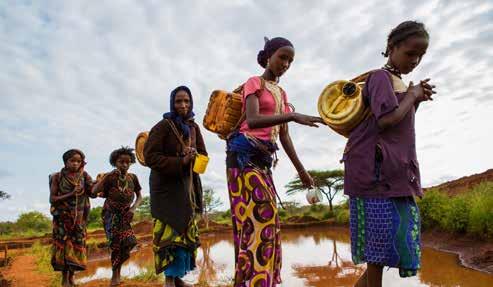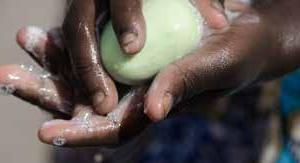
5 minute read
Africa round-up
Water & Sanitation in Africa
ETHIOPIA
Advertisement
A model to replicate
Officials have commended Ethiopia’s ‘One’ model, under which the government runs its Water, Sanitation and Hygiene (WASH) National Programme (OWNP).
The model translates to a single consolidated WASH account and budget. This enhances transparency in the programme’s management and has helped to improve implementation by eliminating the duplication of roles among partners.
The OWNP, which is said to have steadily enhanced the well-being of the country’s rural and urban communities, focuses on constructing new infrastructure to extend access to water and sanitation as well as refurbishing old, disused equipment such as pumping stations and pipelines. Technical training for maintenance
personnel and users is also provided. The OWNP was implemented in 2014 and benefited around 4.3 million people by the end of the five-year first phase in 2019.
The Ethiopian government is working with the African Development Bank (AfDB), the World Bank, the British Department for International Development, Finland, the UN Children’s Fund, and other partners to deliver greater access to water across the country.
According to Osward Chanda, manager: Water Security and Sanitation Division, AfDB, this financing model is being increasingly adopted across the continent. “Many development partners have come to realise that working and planning together is more efficient, improves harmonisation, and delivers better results for beneficiaries,” he says.
THE GAMBIA
Overcoming supply challenges
The Gambia has received a US$43 million (R736 million) grant to help strengthen access to energy and water in the country.
Nearly 50% of Gambians still have no access to electricity; in urban areas, roughly 69% of the population has access to safe drinking water. Further, the quality of services is weak due to frequent service outages, with some neighbourhoods not receiving water for days, weeks, or even months at a time.
While the National Water and Electricity Company (Nawec) has made significant improvements in its operational and financial performance in recent years, the utility has yet to achieve financial viability. Customers still face erratic supply of water and electricity, which have been exacerbated by the Covid-19 pandemic.
The additional financing will further strengthen Nawec’s transmission and distribution network, provide additional support to transform Nawec into an efficient and credit-worthy utility, and expand the scope of the Gambia’s Electricity Restoration and Modernisation Project to the water sector.
KENYA


Mass hygiene drive
Safe Hands Kenya, a mission-driven alliance of Kenyan companies and community organisations, is scaling up its mass sanitation drive to combat Covid-19.
Some 1.25 million people were reached during May and part of June in Nairobi. The alliance is on track to reach 2 million people by the end of June with free soap, handwashing stations, face masks, public spraying programmes, and a national behaviour change campaign.
Safe Hands is prioritising activities for those in informal settlements, where social distancing and other recommended approaches to curbing the spread of Covid-19 are nearly impossible asks.
The alliance has built a geospatial demand and supply allocation map, using several layers of data to target with precision, and partners distribute products using IoT-enabled technologies. The immediate provision of the tools for rapid mass sanitation, accompanied by a highly creative behaviour change campaign to motivate people to use them effectively, is the most effective way to keep people safe and society functioning.
The alliance’s approach to product design and distribution is also informed by human-centred design principles to maximise the rate of adoption. The behaviour-change campaign – TibaNi Sisi (Swahili: “We are the cure”) – was designed to capture people’s imaginations and pay public health dividends long beyond the Covid-19 pandemic by improving general hygiene practices, with concomitant benefits for other sanitation-related diseases and deaths.
Additional Safe Hands chapters are now also up and running in Tanzania and Ethiopia.
NIGER
Improving livelihoods
The World Bank has approved additional financing of US$150 million (R2.56 billion) for the Niger Basin Water Resources Development and Sustainable Ecosystems Management Project, also known as the Kandadji programme.
The programme will contribute to increasing access to energy and water resources, and will improve the livelihoods of about 330 000 people living in the Niger River Basin. The additional financing supports irrigation development, environmental and social safeguarding measures, and local community development. Specifically, TANZANIA
Boosting water and sanitation
Some 250 000 residents in Mwanza, Tanzania, will benefit from improved water and sanitation, and a cleaner environment, as part of the Lake Victoria Water and Sanitation Programme.
The project is part of a three-country initiative to improve water in towns around the lake in Uganda, Kenya and Tanzania. This includes new water infrastructure, as well as public health education and awareness-raising hygiene campaigns. This will also strengthen resilience to the novel coronavirus pandemic in informal settlements and vulnerable communities. it will support the construction of improved housing in resettled communities, provide drinking water and sanitation, and provide support to resettled populations, with a particular focus on vulnerable populations.
“Given the challenges facing the region, this funding will help the country adapt to the impacts of climate change by reducing beneficiaries’ vulnerability to drought, promoting local adaptation measures and paving the way for renewable electricity in Niger,” says Soukeyna Kane, country director: Niger, World Bank.
The Kandadji Dam, with its reservoir and regulation system, will enhance The project is implemented by local partners and backed by the European Investment Bank in partnership with UN-Habitat, Agence française de développement, KfW and the European Commission. the availability and management of water for agriculture development and increase capacity for renewable energy generation in Niger’s part of the Niger basin. This will allow for the irrigation of 45 000 hectares of land and will produce an annual average of 629 GWh of additional electricity, which represents about half of Niger’s consumption in 2018.
This financing will also reduce the time spent by women to fetch water every day by installing standpipes closer to their homes, and promote economic and livelihood opportunities for women and youth through income

generation activities.

ZIMBABWE
Court-ordered water supply
The Harare Water Department has increased its water coverage, targeting areas that had not received water for more than 10 years. This follows a High Court order on the provision of water during the Covid-19-related lockdown period.
Residents have welcomed the increased water supply, which has decongested community boreholes and mobile water bowsers, ensuring increased safety against the spread of Covid-19. Residents in Mabvuku and Tafara recently reported receiving water two days a week consistently for three weeks.
The Combined Harare Residents’ Association has called on the Harare Water Department to improve its water supply coverage to the remaining areas of Harare and to improve its billing.











